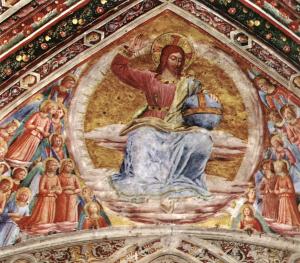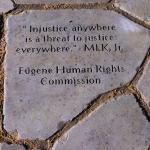
Christ teaches that we are going to have our lives judged; everything about us will be revealed, and through it, who and what we have made of ourselves will be made known to everyone, including, and especially ourselves. We will not be able to hide from the truth anymore. Everyone, including the best of us, have things which we are ashamed about, things which we wish we had not done, but there is no getting away from what we have done, for our actions have helped shape who we have become. Everyone also has done good things in their lives, things which have also transformed us and shaped who and what we have become. The judgment helps us see everything we have done and discern all the good and bad in it, to see, moreover, how they all come together to form our own personal identity. This is why our judgment, while it is ultimately for our own good as it can help awaken in us the desire for something greater than we have achieved and so be open to the fullness of deifying grace, it is something often fear, for coming to know ourselves is a difficult process and will take us through many different states and experiences before we truly arrive where we are meant to be.
While we should go into the judgment with a humble disposition, if we have faith, we should also go into it with hope. For we should know that Christ himself will be the judge and he will judge us not only with justice, but mercy and love; indeed, the judgment itself can be said to be the judgment of love. Insofar as we have developed love within us, and so have properly developed who and what we are in relation to the image of God given to us, we will find the judgment is not a thing to fear but to cherish, for the only judgment love can give for love is love, that is, love will be rewarded with more love. For this reason, when Jesus gave a parable representing the last judgment, he said that those who have done good for others, those who acted to benefit and elevate others, will be rewarded for that love:
Come, O blessed of my Father, inherit the kingdom prepared for you from the foundation of the world; for I was hungry and you gave me food, I was thirsty and you gave me drink, I was a stranger and you welcomed me, I was naked and you clothed me, I was sick and you visited me, I was in prison and you came to me.’ Then the righteous will answer him, `Lord, when did we see thee hungry and feed thee, or thirsty and give thee drink? And when did we see thee a stranger and welcome thee, or naked and clothe thee? And when did we see thee sick or in prison and visit thee?’ And the King will answer them, `Truly, I say to you, as you did it to one of the least of these my brethren, you did it to me.’ (Matt. 25:34-40 RSV).
What is done to others is also done to Jesus because God, in the incarnation, assumed human nature and became consubstantial with the whole of humanity. Just as the Trinity is united in the divinity, so Jesus, in the incarnation, is united with us all in our humanity. Everyone is connected in and through our common nature, and so what is done to one of us is, in a way, done to all of us. This is also how and why Jesus can and will save the whole of humanity, for his death and resurrection takes the whole of humanity with him.
Humanity, though one, lives as if it were not one as everyone tries to separate themselves from each other, to become distinct individuals with no connection to anyone else. This is the result of the contamination of sin, for sin tries to break apart and destroy the good contained within our humanity. Nonetheless, sin is unable to do so completely; our nature remains, and with it, our links to each other remains. All the fractures sin placed in our nature are healed by Jesus so that in the eschaton, humanity will realize its unity and everyone, though remaining their own distinct person (just as the persons of the Trinity are distinct) will find themselves united and one with everyone else.
Our nature, our unity with each other, would ultimately have been lost without the incarnation; our sin would have divided up and destroyed humanity, wiping all of us out of existence. Jesus, the New Adam, restored the integrity of human nature in himself and now, because of our unity with him, we find we can partake of that integrity, to have ourselves be as if we had never sinned. But there is more. Thanks to the incarnation, we will be given deifying grace; not only will we find ourselves restored to the goodness we had without sin, to our original face, as it were, we will be given grace so as to be able to become something greater.
But, until we reach the eschaton, until humanity is fully restored to its integral goodness, sin will continue to have its role in history. People will suffer thanks to such sin. When this happens, because Jesus is connected with and one with everyone through the humanity he shares with them, he can be said to be at every point of injustice in the world, sharing in the pain and sorrow of those inflicted by it. Truly, what is done to others is done to him! This is why Paul tells us to be concerned with what we do, such as what we eat, reflecting upon how we act affects others. For what we do should be done out of love. And so if someone will be harshly affected by our actions, such as if we fail to act out of concern for their safety and instead focus on what we believe our freedom allows us to do, we not only offend them, but Christ, who resides in and with them. “Thus, sinning against your brethren and wounding their conscience when it is weak, you sin against Christ” (1 Cor. 8:11 RSV). If we love them, we will be more concerned about their welfare than our desires; we will love them and do for them what we can, and in doing so, we will likewise be loving Christ, doing what we can for him. If on the other hand, we care less about what they want or even need, and think we should be free to do whatever we want, we show ourselves far from the love which we should possess; in that case, we should truly worry what shall be revealed when we come to the judgment, for we will not be able to hide that unlove from ourselves, We will not be able to justify or use gaslighting to excuse ourselves from what we have done. We will have to face what we have made of ourselves, and we will grieve for all the pain and sorrow we have caused.
Stay in touch! Like A Little Bit of Nothing on Facebook.
If you liked what you read, please consider sharing it with your friends and family!













